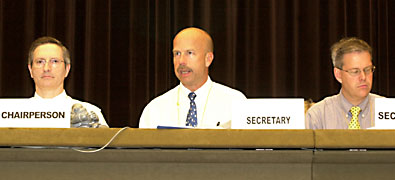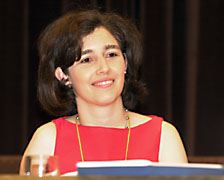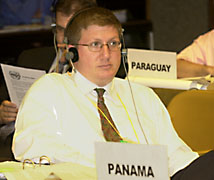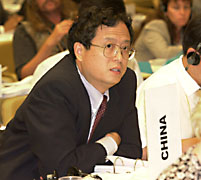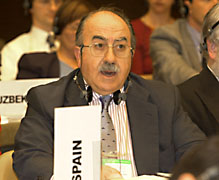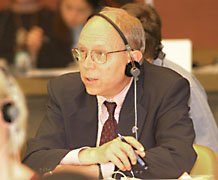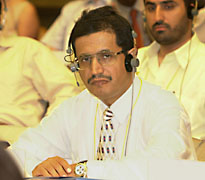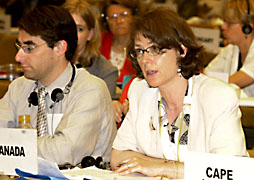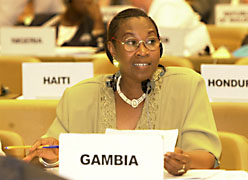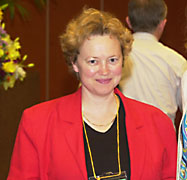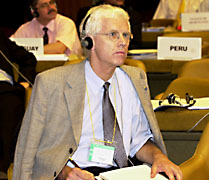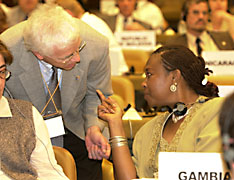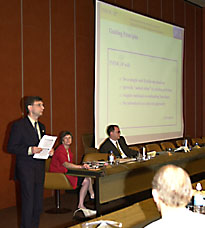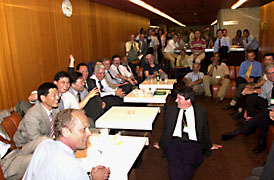|
Technical assistance under Article 12
|
|
 Maria
Cristina Cardenas Fischer UNEP Chemicals, introduced UNEP/POPS/INC6/16,
Technical Assistance under Article 12, on behalf of the Secretariat.
The document recommends, inter alia, that INC-6 consider
establishing a process for developing guidance on technical assistance,
and request the Secretariat to: undertake, in consultation with
the Basel Convention Secretariat, a feasibility study on the establishment
of regional and subregional centers for capacity building and
technology transfer; and develop and conduct a pilot initiative
on regional and subregional centers for the purpose of facilitating
technical assistance. Jim Willis, Head of UNEP Chemicals, highlighted
links with work being done on international environmental governance. Maria
Cristina Cardenas Fischer UNEP Chemicals, introduced UNEP/POPS/INC6/16,
Technical Assistance under Article 12, on behalf of the Secretariat.
The document recommends, inter alia, that INC-6 consider
establishing a process for developing guidance on technical assistance,
and request the Secretariat to: undertake, in consultation with
the Basel Convention Secretariat, a feasibility study on the establishment
of regional and subregional centers for capacity building and
technology transfer; and develop and conduct a pilot initiative
on regional and subregional centers for the purpose of facilitating
technical assistance. Jim Willis, Head of UNEP Chemicals, highlighted
links with work being done on international environmental governance.
|
| |
 Regarding the feasibility study, Panama,
on behalf of GRULAC, emphasized the importance of regional and
subregional centers, supported the feasibility study, and favored
promoting synergies between the chemical conventions as the best
way to consolidate technical assistance.
Regarding the feasibility study, Panama,
on behalf of GRULAC, emphasized the importance of regional and
subregional centers, supported the feasibility study, and favored
promoting synergies between the chemical conventions as the best
way to consolidate technical assistance. |
| |
 China cautioned against using the Basel Convention regional
centers, citing significant differences between the two Conventions.
China cautioned against using the Basel Convention regional
centers, citing significant differences between the two Conventions.
|
| |
|
 Introducing
their concept proposal on a capacity assistance network (CAN)
(UNEP/POPS/INC.6/19), the
Secretariat explained that the CAN is based on institutional
elements in the Stockholm Convention, and that national focal
points, regional/subregional centers, and the Secretariat would
be networked. Introducing
their concept proposal on a capacity assistance network (CAN)
(UNEP/POPS/INC.6/19), the
Secretariat explained that the CAN is based on institutional
elements in the Stockholm Convention, and that national focal
points, regional/subregional centers, and the Secretariat would
be networked.
 In
response to questions from delegates, the
Secretariat outlined its considerations when drafting the concept
proposal, such as avoiding duplications and including developed
and developing countries. Chair Buccini added that regional centers
and national focal points are mandated under the Convention, and
asked if the possible interaction between them is a workable model
for the CAN. In
response to questions from delegates, the
Secretariat outlined its considerations when drafting the concept
proposal, such as avoiding duplications and including developed
and developing countries. Chair Buccini added that regional centers
and national focal points are mandated under the Convention, and
asked if the possible interaction between them is a workable model
for the CAN.
|
|
|
 Spain, on behalf of the EU,
said that for the Union the success of the Stockholm Convention
would be measured by the speed with which capacity building technical
assistance are delivered. He highlighted overlaps and gaps between
the Basel and Stockholm Conventions in terms of technical assistance,
and called for increased collaboration among them and with the
interim secretariat of the Rotterdam Convention.
Spain, on behalf of the EU,
said that for the Union the success of the Stockholm Convention
would be measured by the speed with which capacity building technical
assistance are delivered. He highlighted overlaps and gaps between
the Basel and Stockholm Conventions in terms of technical assistance,
and called for increased collaboration among them and with the
interim secretariat of the Rotterdam Convention.
|
| |
 The US
recommended that guidance for technical assistance be developed
only once developing countries have submitted their national implementation
plans (NIPs). He said the focus of a feasibility study should not
be limited to the Basel Convention regional centers.
The US
recommended that guidance for technical assistance be developed
only once developing countries have submitted their national implementation
plans (NIPs). He said the focus of a feasibility study should not
be limited to the Basel Convention regional centers. |
| |
 Saudi Arabia noted that cooperation with the Basel Convention
regional centers may be appropriate for some regions, but not for
all.
Saudi Arabia noted that cooperation with the Basel Convention
regional centers may be appropriate for some regions, but not for
all. |
| |
|
 Canada
proposed that countries submit to the Secretariat their views
on technical assistance priorities, and that the Secretariat prepare
a proposal on this subject. She called for elaborating the relationship
between the feasibility study and the pilot initiative.
Canada
proposed that countries submit to the Secretariat their views
on technical assistance priorities, and that the Secretariat prepare
a proposal on this subject. She called for elaborating the relationship
between the feasibility study and the pilot initiative.
|
| |
|
 Willis
introduced the topic of best available techniques (BAT) and
best environmental practices (BEP), as contained in Article 5
of the Stockholm Convention. Willis
introduced the topic of best available techniques (BAT) and
best environmental practices (BEP), as contained in Article 5
of the Stockholm Convention.
 Following general discussion, Chair
Bucchini described the mandate of the contact group on BAT
and BEP.
Following general discussion, Chair
Bucchini described the mandate of the contact group on BAT
and BEP.
|
|

